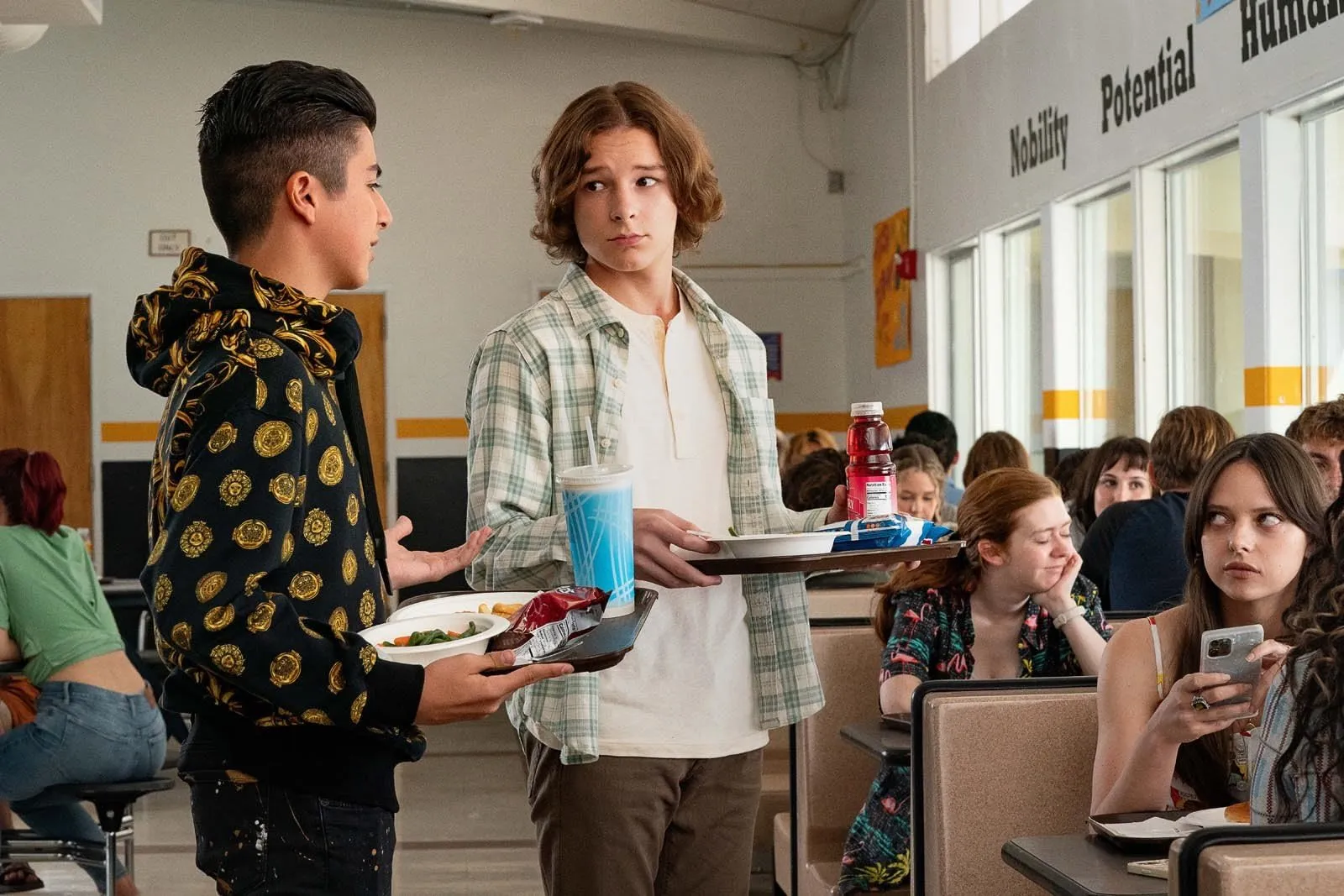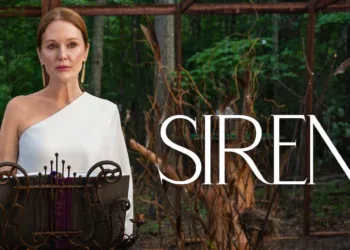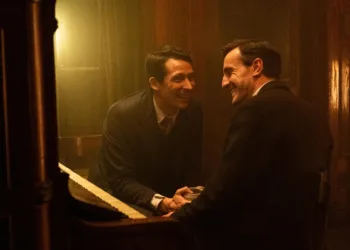High school antics hit the small screen once again in Incoming, the newest Netflix production from writer-director duo Dave and John Chernin. Dropped into our queues like an invitation to senior ditch day, this coming-of-age comedy wastes little time plunging viewers feet-first into the reckless rituals of freshman orientation.
Tagging familiar beats from the genre’s heyday, Incoming focuses its lens on the perilous pursuit of popularity among four newbies navigating the social jungle that is Jefferson High.
Chiefly concerned with claiming their place at the cafeteria round table before the final bell, Benji, Eddie, Connor, and Koosh place their hopes in a rager hosted by Jefferson’s lord of misrule himself. But with adolescence come awkward learning curves and embarrassing spills, as the boys will discover their first party is no exception to life’s lessons in failure and forgiveness.
Under the bravado and belching however lies a sweet sincerity, a wistful appreciation for friendship’s power to heal humiliation’s sting. If Incoming won’t be winning any awards for narrative nuance, its young leads shine in scenes spotlighting compassion over cringe.
There remains joy to be found here amid the jackass hijinks, a reminder that growing up means growing together, stumbles and all. Now pass the chips, the keg’s this way, and senior year starts tomorrow—you might as well enjoy the calm before every storm.
Getting to Know the Crew
Incoming wastes no time introducing us to the ragtag band of freshmen at the center of the story. Leading the pack is Benji, an endearing theater kid with stars in his eyes. Though shy around his longtime crush Bailey, Benji proves a thoughtful pal willing to take risks for his friends.
Those friends include Koosh, the rich kid with a heart of gold but knack for chaotic schemes. Living in the shadow of his popular brother, Koosh aims to prove himself at the party. Then there’s Eddie, the worrier, just trying to survive ninth grade in one piece. And Connor, the pint-sized freshman dubbed “Fetus,” hoping to outgrow cruel nicknames.
Each young man feels authentic in their nerves and bravado. While the boys rely on familiar tropes, the performances ensure they feel like real teens learning as they blunder. Their bond anchors the story in something relatable.
Beyond the boys, other characters leave less of an impression. Alyssa, Benji’s antagonistic sister, gets a little beyond superficial traits. Bailey remains dazzling but distant. And the popular girl Katrina amounts to little more than temptation.
One adult makes an attempt at depth—Bobby Cannavale’s teacher, Mr. Studebaker, who brings empathy to a sad sack desperate to recapture glory days. But ultimately, even he’s reduced to punchlines.
With so much devoted to the hijinks, Incoming struggles to develop its cast beyond surface level. While the boys charm, most feel as two-dimensional as the paper-thin high school stereotypes they emulate. And without stakes or complexity, it’s hard investing beyond their antics alone. With richer portrayals, these characters might have memorably come alive rather than merely coast on comparisons.
Rising to the Occasion
Incoming wastes little time plunging us into the perilous pressures of freshman year. We’re introduced to Benji and his ragtag group of pals—Koosh, Eddie, and Connor—on their first nervous day at Jefferson High. As cabals of cool kids roam the halls like lords over serfs, our young underdogs scan for any opportunity to climb the social ladder.
Their hopes land upon Koosh’s grand plans for the weekend’s blowout bash. With parents out of town, he envisions a rager to cement his reputation as the party prince. But entry comes at a fee—only one friend can accompany Koosh as his “plus one.” Desperate to impress his crush Bailey, Benji schemes for the coveted spot while his pals seek their own resolutions.
Friday night arrives, and Koosh’s estate erupts in debauchery. Walls shudder with bass as teenagers tank up on spirits and poor life choices. Among the chaos, our lads each pursue their missions. Benji strives charming Bailey, Koosh lies his way to awkward encounters, and Eddie & Connor embark on an improvised caretaking job they’ll soon beg to forget.
Predictably, high jinks ensue—spin the bottle turns traumatic, suspicious substances cause emotional turmoil, and digestive disasters demand the cast invest in toilet bleach futures. Through it all, a few lessons emerge: friends prove sturdier than status, hearts want confusingly more than bodies, and growing up means acceptance that heroes have clay feet too.
By week’s end, our boys endure hits to ego and stomach alike. But despite lumps and puddles, the bonds that brought them together exit stronger than ever. Perhaps that’s the real report card of adolescence—not how we handle hard liquor but how we lift each other in the sober light of day.
Navigating High School Hurdles
Like any freshman, Incoming dives headfirst into high school’s perennial difficulties. Chief among them remains the cafeteria-style social strata that determines teenage worth. At Jefferson, our boys find themselves square pegs in a round hole of “cool kids” genetics seem to favor.
Relationships further complicate adolescence. Benji pines for the ever-elusive Bailey, while Alyssa grapples with sexuality’s setbacks. Peer ties face tension too, as Koosh and Connor feel family and faction forcefulness. Only in unity do these ties, fraught as they are, empower the outcasts against oppressors.
None escape reconsidering conduct once norms. Studebaker’s midlife crisis cuts close to misdeed, just as Alyssa learns “perfect” needn’t mean “happy.” Even ostensibly predatory figures, from Kayvon to party predators, get comeuppances cutting through sugarcoating with sobering slapstick.
Of course, Incoming exhibits high school’s familiar institutions with a winking eye. Exaggerated tropes like queen bees and punch bowls serve satire over reverence, ribbing cliches that feel carved more from Hollywood than human nature.
Ultimately, lessons surface that transcend teen movie boilerplate. Things like compassion outweighing cruelty, solidarity trumping solitude, and second chances proving sweeter than first looks, however fleeting their framing frivolity. Some zings may miss, but its heart lands true: growing up means growing together, stumbles and all.
Bringing Incoming to Life
While lacking the polish of bigger budgets, Incoming nails fundamentals that sell teen classics. Davy & Johnny Chernin pilot the cruisy camerawork, coasting after mischievous minds in motion. Cutting captures chaos at a clip, keeping energy high throughout hijinks and heartfelt moments alike.
Sound too suits the scene, splicing zany sing-alongs between dialogue carrying the wit and weight youth carry in careless company. Music melds naturally versus drowning distances between characters as complex as their contradictions.
Performances propel Incoming above premises passing familiar. Mason Thames and Ali Gallo, in particular, lend likability and layers beyond roles’ surfaces. Their earnestness offsets edgier elements, reminding us that despite debauchery, dynamics drive the story forward.
Of course, comparison proves inevitable for any offering in such a saturated company as John Hughes or Superbad. But Incoming emerges its own thanks to heartfelt homage. Where influences felt formulaic, these filmmakers find freshness in focusing character over caricature.
Some crassness misses the comedic mark, as raunch risks replacing relatability. But Incoming redeems itself through empathy for every player navigating the nonsense nature demands of youth. Its execution upholds spirit, sparking teenage tales timeless despite trends that come and go.
Ruffling Feathers or Raising the Bar?
Incoming drew scrutiny for some storylines pushing boundaries. Its drunk driving subplot and blackout scenes tread close to glorifying danger. Meanwhile, skeevier characters like Kayvon exist more for unease than laughs.
At its heart though lies earnest intent to revive a fading format, not offend. And as missteps go, they miss more than they hit. The Chernins take risks reviving R-rated high jinks but anchor antics in authentic adolescent angst and earnest interpersonal bonds.
Critics question if demand remains for such content. Yet films like Booksmart and Blockers prove audiences crave genres upgrading to today’s views while retaining nostalgia. Incoming taps nostalgia but updates with progressive views on women, LGBTQ issues, and the nuances of teenage life.
While imperfect, it pushes the form forward versus lazily pandering to past tropes. And fans flock to stories feeling real versus engineered solely to shock. The Chernins understand teenagers not as clichés but as people, and for that, Incoming deserves kudos over criticism.
The genre survives by retaining spirit while modernizing. Incoming does just that, giving hope for a brighter future if creators continue walking the line between realism and reckless stuntwork with such care and care. Though not a classic, Incoming gets passing marks for progress.
Touching Down from Takeoff
Incoming offered freshman flicks some raucous moments, yet struggled to sustain flight. Fine performances and flashes of sweetness among hijinks gave hope of heights greater than reached. But an unsteady hand at the wheel left signature set pieces, like Studebaker’s party drop-in, more amusing in hindsight than felt in real time.
Weak character development beyond Benji’s burdened believability. Thinner plots leave rushing to resolution without cementing why viewers invested beyond juvenile jokes alone. And while pushing boundaries merits praise, miscalculated missteps morphed merriment into moments better missed.
Still, the Chernins display talent deserving another turn. With sharper focus on the feelings fleshing out familiar faces, their vision could resonate beyond imitating icons of cinema past. For capturing camaraderie’s essence, if not its magnitude, Incoming earns respect.
With refinement, their brand of brassbound borrowing from teen classics holds potential for progress. With luck, future flights may find firmer footing, fusing nostalgia to contemporary concerns in a manner connecting with audiences as giftedly as its gambles made some chuckle. For a freshman feature, Incoming shows signs its directors will soar higher still.
The Review
Incoming
Incoming shows promise but ultimately struggle to launch beyond the mimicry of teen comedy forebears. The Chernins demonstrate talent warranting another go with strengthened storytelling to match their flair for friendship's fondness. With polish shaping stronger scripts and characters, their future efforts could take flight.
PROS
- Strong central performance from Mason Thames as Benji
- Authentic portrayal of teenager friendships and social dynamics
- Humor and heart in scenes of sweetness between characters
- Efforts to revitalize the R-rated teen comedy genre
CONS
- One-dimensional side characters beyond main boys
- Reliance on crude gags damages beliefability at times.
- Uneven pacing and underdeveloped plot
- Missed opportunities for social commentary




















































Discussion about this post